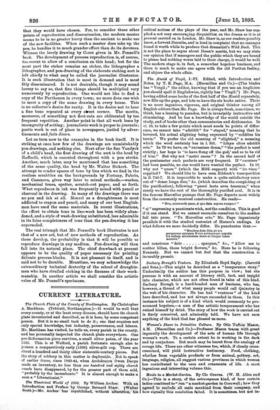The 2Eneid of Virgil, Edited, with Introduction and
Notes, by T. E. Page, M.A. (Macmillan and Co.)—(The binder has " Vergil ;" the editor, knowing that if you use an Anglicism you should spell it Englishwise, rightly has " Virgil.") Mr. Page, having edited some books of the first half of the 2Eneid separately, now fills up the gaps, and lets us have the six books entire. There is no more ingenious, vigorous, and original thinker among all English editors than Mr. Page. He is always fresh, sometimes, we think, has a leaning to paradox, but is invariably instructive and stimulating. And he has a knowledge of the world outside the study, and of books other than commentaries and dictionaries. In vi. 16, to take a few points which must needs be points of differ- ence, we cannot take " adstitit" for " stayed," meaning that he hovered, his actual alighting being expressed by " redditus his terris." We prefer the old meaning of "alighted," a meaning which the word certainly has in i. 301. " Libyre citus adstitit oris." In 79 we have, on " excussisse deum," "the perfect is used strictly ; her hope is ' to have flung off the god,' and so to be rid of him." But why not "metri c,ausa " ? In the second half of the pentameter such perfects are very frequent. If " excutere " had been possible, no one would have wanted the perfect. In 96, why not " quam " (which the MSS. support) with " ire viam" supplied ? We should like to have seen Ribbeck's transposition in 11. 740-7. It is impossible to make a quite satisfactory sense out of " donee longa dies," &c. (which describes the completing of the purification), following "panel ]seta arva tenemus," when surely we have the rest of the thoroughly purified soul. It is in the famous Marcellus passage that Mr. Page departs most widely from the commonly received construction. He reads- " Hee, miserande peer, si gin fats aspera rumps! "
" si " expressing a passionate wish, not the condition. This is good if it can stand. But we cannot reconcile ourselves to the sudden fall into prose. " Tu Marcellus eris." Mr. Page ingeniously parallels it with the studied restraint of Horace's endings. In what follows we more decidedly differ. He punctuates thus :- " Manibus date lilia plc nis prrpnreos spargam flares animamque nepotis his ealtem adeumalem dards et fnngar Mani manere."
and construes "date spargam," &c., "Allow me to scatter fillies, those bright flowers," &c. Here he is following Kennedy. But we cannot but feel that the construction is incurably prosaic.


































 Previous page
Previous page